So, that is my confession. I am skeptical of those who proclaim that a [manmade global-warming] crisis is threatening civilization and that questioning of this premise is tantamount to "Holocaust denial." I continue to seek the truth, and acknowledge that my current opinions, shared by thousands of knowledgeable scientists, could be wrong. It seems to me that such a principled position is the hallmark of scientific skepticism. But, then again, maybe I'm just nuts.
But I digress . . .
 A long time ago, in what now seems like a galaxy far, far away, I was growing up in suburban Baltimore, watching the likes of
UFO-proponent J. Allen Hynek on the Mike Douglas
and Merv Griffin afternoon TV talk shows of the 1960s and '70s. And I was swallowing
everything they were selling. My grandmother had often told me of the UFO that she (along with my grandfather and uncle) had seen
fluttering in the sky one afternoon in the early 1950s, so that probably explains why one of my favorite movies, which was frequently
being rerun on TV, was Earth vs. the Flying Saucers. During my early teens I even became a dues-paying member of the National
Investigations Committee on Aerial Phenomena (NICAP)
A long time ago, in what now seems like a galaxy far, far away, I was growing up in suburban Baltimore, watching the likes of
UFO-proponent J. Allen Hynek on the Mike Douglas
and Merv Griffin afternoon TV talk shows of the 1960s and '70s. And I was swallowing
everything they were selling. My grandmother had often told me of the UFO that she (along with my grandfather and uncle) had seen
fluttering in the sky one afternoon in the early 1950s, so that probably explains why one of my favorite movies, which was frequently
being rerun on TV, was Earth vs. the Flying Saucers. During my early teens I even became a dues-paying member of the National
Investigations Committee on Aerial Phenomena (NICAP)
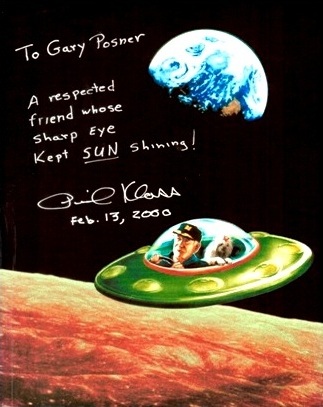 It wasn't for another decade that a Baltimore Sun article quoting
UFO skeptic Philip J. Klass would prompt me to write Klass a
letter that would lead to my befriending him, and through him Robert Sheaffer, and through him James Oberg, opening my eyes to the wide
world of scientific skepticism. I soon thereafter became a member (with Sheaffer, Oberg, and several others) of Klass' UFO
Subcommittee within CSICOP (now CSI
It wasn't for another decade that a Baltimore Sun article quoting
UFO skeptic Philip J. Klass would prompt me to write Klass a
letter that would lead to my befriending him, and through him Robert Sheaffer, and through him James Oberg, opening my eyes to the wide
world of scientific skepticism. I soon thereafter became a member (with Sheaffer, Oberg, and several others) of Klass' UFO
Subcommittee within CSICOP (now CSI
In that first letter to Klass, I had inquired about a number of "classic" UFO cases which, at least as reported, seemed explainable to
me only as extraterrestrial spacecraft. I read Hynek's newest book that same week and wrote to him as well, centering on some
legendary UFO photographs that he seemingly accepted as genuine. Klass promptly mailed me the paperback version of UFOs Explained,
with an accompanying note indicating (correctly) that his book would likely answer all of my questions. In stark contrast, Hynek's
two-page reply, though gracious, failed to answer a single question and contained flagrant
misrepresentations about UFOs Explained. As much as I still wanted to believe, the truth was far more important to me than my
suddenly wavering confidence, since childhood, that I knew the shocking secret that
the government was hiding from the public. My journey from naïve "believer" to
open-minded scientific "skeptic"
A few years thereafter, in the role of honest broker between the two opposing camps in UFOlogy, I engaged in protracted correspondence with Marcello Truzzi. We endeavored during the 1982-83 timeframe to come up with a more workable definition of "UFO," to hopefully then be followed by the creation of a perennial committee for determining the scientific value of each case that fulfilled our criteria. Allen Hynek's failure to join in doomed the project, but despite Klass' early prediction of just such an outcome, I had felt compelled to at least make the effort.
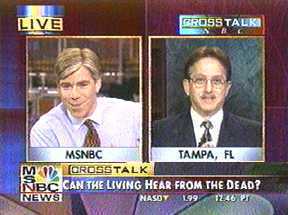 While UFOs have been of primary interest to me since childhood, as a scientific skeptic my examinations and writings have reflected open-mindedness toward ascertaining the truth or falsity of all sorts of implausible-sounding claims. In fact, since 1989, Tampa Bay Skeptics (TBS, which I founded in 1988) and I have been
offering $1,000 to anyone who can demonstrate to us, under properly controlled conditions, evidence of any paranormal phenomenon.
Word of this challenge soon reached a reporter with Copley News Service (San Diego, CA), whose "Wireless Flash" was disseminated to radio stations across North America, generating on-air telephone interviews with me from such cities as
Cincinnati, Chicago, Miami, Toledo, Edmonton and Vancouver (Canada), and by Boston's legendary Larry Glick. I've also presented at several conferences, among them the November 2001 Center for Inquiry Transnational symposium in Atlanta
(listen here), and have appeared on numerous local and network television programs including The Unexplained (A&E), Crosstalk NBC (on MSNBC, hosted by David Gregory
While UFOs have been of primary interest to me since childhood, as a scientific skeptic my examinations and writings have reflected open-mindedness toward ascertaining the truth or falsity of all sorts of implausible-sounding claims. In fact, since 1989, Tampa Bay Skeptics (TBS, which I founded in 1988) and I have been
offering $1,000 to anyone who can demonstrate to us, under properly controlled conditions, evidence of any paranormal phenomenon.
Word of this challenge soon reached a reporter with Copley News Service (San Diego, CA), whose "Wireless Flash" was disseminated to radio stations across North America, generating on-air telephone interviews with me from such cities as
Cincinnati, Chicago, Miami, Toledo, Edmonton and Vancouver (Canada), and by Boston's legendary Larry Glick. I've also presented at several conferences, among them the November 2001 Center for Inquiry Transnational symposium in Atlanta
(listen here), and have appeared on numerous local and network television programs including The Unexplained (A&E), Crosstalk NBC (on MSNBC, hosted by David Gregory
That's not to say, however, that I haven't had a few dust-ups along the way. For example, famed Florida-based "psychic detective" Noreen Renier first appeared on my radar screen in 1986, when she and I were guests on a radio program in Orlando shortly after her successful libel suit against a skeptic who had referred to some of her claims as "fraudulent." We exchanged cordial handshakes and got along well enough. But two years later, with the birth of Tampa Bay Skeptics, if only for geographical reasons Renier naturally became a prime target of TBS's scrutiny. She refused to be tested by us, and I would grow to become, as she wrote in her 2005 memoir, A Mind for Murder, her "most relentless" antagonist (the chapter containing her criticisms of me was scrubbed after the book's first edition). Yet in my published review, though I held her feet to the fire for much of its content, I acknowledged in my opening paragraph that "I found the entire book an entertaining adventure." And in my contributed chapter about Renier for Joe Nickell's 1994 compilation, Psychic Sleuths: ESP and Sensational Cases, despite the three anonymous threatening telephone calls I received during the course of my research (listen here), the first four pages are devoted entirely to the most impressive endorsements of her that I could find. Even against a nemesis, my internal compass naturally guides me in a principled direction.
But I was admittedly tested to my limits by Jerome Clark, past editor of Fate magazine, who was now editing the International UFO Reporter, published by the J. Allen Hynek Center for UFO Studies. In a 1992 IUR editorial about CSICOP (now CSI) and Skeptical Inquirer, his litany of half-truths about Philip Klass, James Oberg and myself culminated in this pronouncement: "For CSICOP it is not enough to say that those with whom it disagrees are wrong. It must also depict them as loathsome human beings." To make certain that Clark was indeed citing me as such an offender, I inquired, and he replied in part, "From all available evidence … you consider ufologists to be a loathsome lot … moral lepers. … I hate to tell you this, Doc, but the shoe fits. Wear it in style."
Given the defamatory nature of Clark's reckless accusation, he next heard from my attorney, requesting a retraction, apology and clarification. In response, Clark offered to "insert a paragraph into our next editorial stating Dr. Posner's concerns and making it clear that he does not consider 'pro-paranormal activists,' including ufologists, to be 'loathsome human beings.'" I promptly accepted, but Clark reneged and the best I got was a "Letter to the Editor" that was followed by, "The editors of IUR cannot respond to this letter from Dr. Posner because his legal counsel demanded that we provide no 'adversarial critique,'" thus revealing that Clark's rebuttal would have said the opposite of his feigned "paragraph [in] our next editorial." Perhaps at that point I finally was justified in considering that at least one UFOlogist might be a "loathsome human being," though, as a clinician, some sort of non-volitional thought derangement seemed to me a more likely explanation for his vexatious behavior.
Being falsely accused, by an intellectual adversary, of depicting those with whom I disagree as "loathsome," is one thing.
Being falsely branded, by leaders of my own community of scientific skeptics, as an anti-science "climate denier" (connoting moral
equivalence to a loathsome "Holocaust denier")
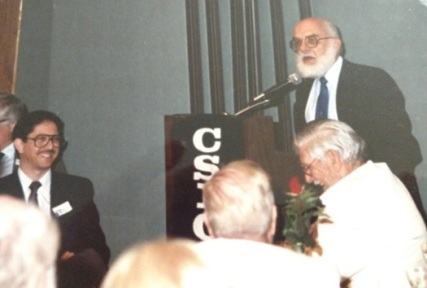
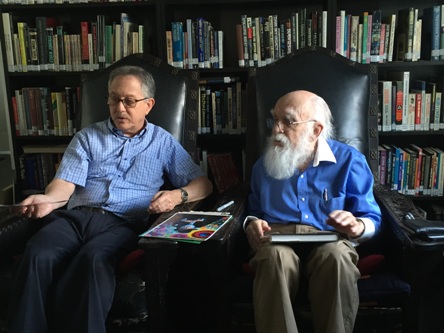 My writings have also appeared as articles in magazines and journals such as the Center for Inquiry's Free Inquiry, the
Skeptics Society's Skeptic, the now-defunct Scientific Review of Alternative Medicine (as a contributing editor), as well
as chapters in several books, including (by invitation of CSI's founder, Paul Kurtz) Skeptical Odysseys: Personal Accounts by the
World's Leading Paranormal Inquirers. One of my articles
for Skeptical Inquirer, which generated far more letters to the editor than had any other item in its then-15-year history, so
delighted Martin Gardner that he featured it in his opening chapter of Weird Water & Fuzzy Logic. And James "The Amazing" Randi
(click images on left and right) had me serve as one of two (with Wally Sampson) medical consultants for his
authoritative exposé, The Faith Healers.
My writings have also appeared as articles in magazines and journals such as the Center for Inquiry's Free Inquiry, the
Skeptics Society's Skeptic, the now-defunct Scientific Review of Alternative Medicine (as a contributing editor), as well
as chapters in several books, including (by invitation of CSI's founder, Paul Kurtz) Skeptical Odysseys: Personal Accounts by the
World's Leading Paranormal Inquirers. One of my articles
for Skeptical Inquirer, which generated far more letters to the editor than had any other item in its then-15-year history, so
delighted Martin Gardner that he featured it in his opening chapter of Weird Water & Fuzzy Logic. And James "The Amazing" Randi
(click images on left and right) had me serve as one of two (with Wally Sampson) medical consultants for his
authoritative exposé, The Faith Healers.
There was thus no question as to my bona fides within the community of scientific skeptics. In fact, despite global warming having already become a hot-button issue within the skeptical community, Skeptical Inquirer published my 2010 article "Assessing the Credibility of CFI's [Center for Inquiry's] 'Credibility Project'" in which I questioned its conclusions regarding the alleged lack of credibility of scientists with dissenting views about climate alarmism. And three years later, my "One Skeptic's View of the 'Global Warming' Controversy" ran in S.I.'s then-companion Skeptical Briefs newsletter.
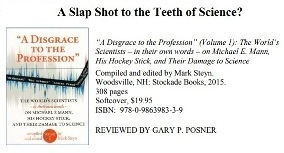 Having received some pushback but no concerted backlash from either of those articles, I was a bit disappointed when, in 2015,
Skeptical Inquirer (and subsequently Skeptic as well) rejected my review of Mark Steyn's A Disgrace to the Profession: The World's Scientists on Michael Mann, His Hockey Stick [Graph], and Their Damage to Science (click image on right).
Modesty almost prevents me from mentioning that it was as
adroitly written as anything I had previously produced, and for any "snowflakes" at risk of melting in its light, I was courteous enough
to lead with a prominent "Trigger Warning." I even labeled the book's author a "Limbaugh-like loudmouth," and in conclusion recommended it
"if for no other reason than to raise one's awareness as to why so many scientists, and those who read their words, still struggle
to make the leap upon the climate-change bandwagon." Dr. Mann, a personal friend of Ken Frazier, S.I.'s editor, would soon be
added to CSI's growing list of climate-activist Fellows. But in fairness, Steyn does come at it from a strident political perspective
which, in hindsight, probably justified the nixing of my tendered masterpiece.
Having received some pushback but no concerted backlash from either of those articles, I was a bit disappointed when, in 2015,
Skeptical Inquirer (and subsequently Skeptic as well) rejected my review of Mark Steyn's A Disgrace to the Profession: The World's Scientists on Michael Mann, His Hockey Stick [Graph], and Their Damage to Science (click image on right).
Modesty almost prevents me from mentioning that it was as
adroitly written as anything I had previously produced, and for any "snowflakes" at risk of melting in its light, I was courteous enough
to lead with a prominent "Trigger Warning." I even labeled the book's author a "Limbaugh-like loudmouth," and in conclusion recommended it
"if for no other reason than to raise one's awareness as to why so many scientists, and those who read their words, still struggle
to make the leap upon the climate-change bandwagon." Dr. Mann, a personal friend of Ken Frazier, S.I.'s editor, would soon be
added to CSI's growing list of climate-activist Fellows. But in fairness, Steyn does come at it from a strident political perspective
which, in hindsight, probably justified the nixing of my tendered masterpiece.
With that predicate laid, let's revisit my opening paragraph. By 2009, more than 20 years into my stewardship of Tampa Bay Skeptics, I had been thinking critically, but not yet writing, about climate-change alarmism, and was thus not yet feeling any heat from my unskeptical "skeptic" colleagues. But I was beginning to take offense to comments from Al Gore, Pulitzer Prize-winning columnist Ellen Goodman, and others who were sounding the alarm and ascribing the moral equivalence of "Holocaust denier" to those applying skeptical scrutiny to their clarion call. Thus, my "Confessions of a 'Holocaust Denier'" appeared in that spring's TBS newsletter. Little did I know that my shit had now officially begun its inexorable journey toward the fan!
As I have always acknowledged, I possess no particular expertise with respect to man's contribution to climate change and am largely at the mercy of those who do. And as alarming items began appearing with increasing frequency in CSI's publications, notably absent was any skeptical voice, save for the smattering from Robert Sheaffer and myself. But even if the alarmists are ultimately proven correct, their hypothesis presently seems so equally at home with floods as with droughts, ice accumulations as with meltings, and multi-decadal temperature plateaus (or declines) as with a rising "fever," as to appear unfalsifiable, and thus it so obviously begs skeptical inquiry within the pages of Skeptical Inquirer. So in response to a December 2015 e-mail from S.I. editor Ken Frazier to Sheaffer, I chimed in with the following to Frazier, receiving not so much as the courtesy of a reply:
… You make reference to Robert and a few of his colleagues as taking a contrarian view, and comparing this to the creation/evolution situation. But such a comparison seems off-base to me. Certainly a few otherwise-respected scientists, blinded by their fear of God's wrath should they dare open their minds, question the reality of evolution, which is supported by much tangible evidence, including the "double" human chromosome #2. … But there are many thousands of respected scientists … who question the "consensus" view that the planet is undergoing calamitous and largely manmade "climate change." One of them is Judith Curry.Curry, by the way, was one of the panelists called to testify at the U.S. Senate Subcommittee on Space, Science, and Competitiveness hearing on December 8, which was intended to be an "Open Inquiry in the Debate over the Magnitude of Human Impact on Earth's Climate." But … the Democrats [had] no interest in questioning Dr. Curry or the other skeptics on the panel. …
In answer to a question that you posed to Robert, no one is suggesting that anyone turn their back on the scientific evidence. That you could even ask such a question of him illustrates the disturbing nature of the divide between the "settled science" camp and the thousands of scientists who are skeptical of AGW alarmism (as Curry testified, she knows personally of many who are too afraid to even make their skepticism known). There is … a statistical correlation between political bent and open- vs. close-mindedness toward even tolerating an airing of the skeptical scientists' arguments, and some insight into this political divide might be gleaned by reading liberal columnist Kirsten Powers' bestseller, The Silencing: How the Left is Killing Free Speech, or by merely watching this C-SPAN interview of her. I strongly suspect that had Powers not escaped from the progressive "bubble" by befriending some people at Fox News Channel, the inkling for such a book would have never even occurred to her.
And I have another suggestion that I believe would likely prove enlightening for all of us. … I propose that you extend an invitation to Dr. Curry to be interviewed for Skeptical Inquirer. … And if Curry were to accept (which I believe she should, despite her shoddy treatment at that Congressional hearing) and find herself unable to successfully (to my mind) parry CSI's best efforts at debunking her arguments, that might very well nudge me from my present "agnostic" position.
A year later almost to the day, I sent the following e-mail
Robert Sheaffer has shared with me (among others) his December 16 letter of resignation [from CSI]. I was saddened to read it, but not unsympathetic to his situation.
As I think you have noted in the past, the former Phil Klass brigade [referring to myself, Sheaffer and Oberg
-- click image on right-- and the other members of Klass's "UFO Subcommittee" within CSICOP/CSI] seems to house many/most of CSI's skeptics of climate-change alarmism. Most have been unwilling (quite understandably) to voice their concerns publicly. …I can't speak for our entire group, but I know that I am not alone in having grown up believing in UFOs. … Yet my mind was always (and remains) open to the evidence, which only in my late 20s (upon befriending Phil) did I begin to realize actually pointed in the opposite direction. And perhaps that degree of open-mindedness
-- enough to enable a full-fledged zealot to pivot a full 180-- helps to explain how I (and some of my fellow former UFO believers) can remain open to the proposition that climate-change alarmism may be overblown, despite the entreaties that we accede to consensus and stop behaving like anti-evolutionists.It may also help to explain how most/all(?) of us have eluded capture by the "progressive" bubble and its intolerance of "offensive" speech, which at the extremes runs the gamut from using "he/she/him/her" in conversation to expressing any non-sanctioned thought, especially as relates to progressivism's most championed causes. As food for "offensive" thought, dare I even go so far as to suggest that Richard Dawkins' famous reference to [religion as] a "virus of the mind" may [aptly apply to] such "progressivism"?
That said, I have recently reread your reply to Robert's December 3, 2015, letter. … Though Robert may feel otherwise, I found [your reply] quite thoughtful and thorough. That is why I was so disappointed in not receiving any response at all to my own 12/17/15 e-mail to you … at the end of which I suggested inviting Judith Curry to be interviewed for S.I. (Roger Pielke [Jr.] would seem to be another excellent choice in light of his recent [Wall Street Journal] column).
In the old Klassian days to which Robert refers, CSICOP enthusiastically engaged with the likes of Allen Hynek and [Harvard "UFO abductionist"] John Mack
-- proponents of ideas diametrically (unlike Curry's and Pielke's) opposed to those espoused in S.I. And you assured Robert a year ago, "We advocate critical thinking, no matter the subject. We are always focused on the scientific, empirical evidence, not on any ideology or political position." I therefore sincerely hope that you will reconsider (or consider if you haven't already) interviewing Curry and Pielke, which would be not merely fitting for S.I. but so obviously vital to its stated mission. …
 As of this writing, the crickets are still chirping regarding my appeals to have S.I.'s climate-change experts thrash it out with
a peer skeptical of climate "alarmism." Instead, a submitted September 2017 "Letter to the Editor" from me was, over my strenuous objections, teed up by Frazier for attack by Dr. Mann (and another) in a Skeptical Inquirer column (click image on right). In response, I submitted the following "Letter to the Editor," which Frazier rejected for publication:
As of this writing, the crickets are still chirping regarding my appeals to have S.I.'s climate-change experts thrash it out with
a peer skeptical of climate "alarmism." Instead, a submitted September 2017 "Letter to the Editor" from me was, over my strenuous objections, teed up by Frazier for attack by Dr. Mann (and another) in a Skeptical Inquirer column (click image on right). In response, I submitted the following "Letter to the Editor," which Frazier rejected for publication:
The handling of my letter as fodder for an "exchange" on climate-science criticism (January/February 2018, pages 61-62) lacked crucial context. Your introduction neglected to mention that as a CSI scientific consultant but climate non-expert, I have repeatedly urged Skeptical Inquirer to engage with a politically independent climatologist like Judith Curry, former chair of the School of Earth and Atmospheric Sciences at the Georgia Institute of Technology, who eschews bandwagoning in favor of keeping a critical eye on her own field. But rather than inviting Curry to submit an article, speak at CSICon [CSI's annual convention], or (as I have most strongly advocated) sit for a hard-hitting interview with peers such as the exchange's "two noted scientists and climate experts," they instead were fed one of my other letters like shark bait.Michael Mann accuses me of the classic logical fallacy of "special pleading" as if my uncontested meteorological points about [hurricanes] Sandy and Harvey justify the moniker of "denier." Rather, they were offered because those who mistakenly ascribe the catastrophic destructiveness of those storms to climate change ignore their "special" circumstances. He then asserts that record-high global oceanic temperatures are fostering additional exceptionally strong hurricanes "[as] now, with Irma, [which formed and strengthened over] the open Atlantic. … Perhaps Mr. (he knows I'm a medical doctor) Posner wants to explain that away as a freak chance occurrence too." Well, shark vs. bait isn't exactly a fair fight, so here is what Dr. Curry would tell him (from tinyurl.com/curry-irma):
[Irma] developed over relatively cool waters in the Atlantic-- 26.5 C-- the rule of thumb is 28.5 C for a major hurricane. … So why did Irma develop into a major hurricane? We can't blame 26.5 C temperatures in the mid Atlantic on global warming. The dynamical situation for Irma was unusually favorable. In particular, the wind shear was very weak. Further, the circulation field (e.g., stretching deformation) was very favorable for spinning up this hurricane.And the same page links to the NOAA GFDL (Geophysical Fluid Dynamics Laboratory) "Global Warming and Hurricanes" page, which states that despite such projections for later in the century, "It is premature to conclude that human activities
-- and particularly greenhouse gas emissions that cause global warming-- have already had a detectable [i.e., clearly distinguishable from natural variability] impact on Atlantic hurricane or global tropical cyclone activity." [Update: The "Summary Statement" at the top of that NOAA GFDL page, most recently revised on May 26, 2023, now says, "In summary, it is premature to conclude with high confidence that human-caused increases in greenhouse gases have caused a change in past Atlantic basin hurricane activity that is outside the range of natural variability, although greenhouse gases are strongly linked to global warming. Some possible emerging human influences on past tropical cyclone activity were summarized above. … Human activities may have already caused other changes in tropical cyclone activity that are not yet clearly apparent due to the small magnitude of these changes compared to estimated natural variability, or due to observational limitations."]In lieu of occupying further valuable space dissecting Mark Boslough's ruminations, I will simply opine that participation in a moral crusade, even one as noble as saving the planet, should not require enucleation of one's critical eye. My essay in the Summer 2013 Skeptical Briefs, as well as the other "Climate Change" entries on the Topic Index page of tampabayskeptics.org, account for everything (to my recollection) that I have had published regarding the issues at hand. Readers can judge for themselves whether my efforts represent close-minded "denial" or open-minded "skepticism."
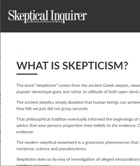 And on its own website (click image on right), CSI helpfully contrasts skepticism vs. denial: "Proper skepticism promotes scientific inquiry, critical investigation, and the use of reason in examining
controversial and extraordinary claims. … Denial, on the other hand, is the a priori rejection of ideas without objective
consideration. … Not all individuals who call themselves climate change skeptics are deniers. Skeptics are those who have devoted
much of their careers to practicing and promoting scientific skepticism." Yet despite there being no doubt as to which definition
describes my endeavors
And on its own website (click image on right), CSI helpfully contrasts skepticism vs. denial: "Proper skepticism promotes scientific inquiry, critical investigation, and the use of reason in examining
controversial and extraordinary claims. … Denial, on the other hand, is the a priori rejection of ideas without objective
consideration. … Not all individuals who call themselves climate change skeptics are deniers. Skeptics are those who have devoted
much of their careers to practicing and promoting scientific skepticism." Yet despite there being no doubt as to which definition
describes my endeavors
Setting me up in this underhanded manner, and labeling/libeling me as a "denier," was the final straw. Accordingly, I submitted my letter of resignation in April 2018 to CSI Executive Director Barry Karr, with cc to Frazier and to his deputy editor, Benjamin Radford.
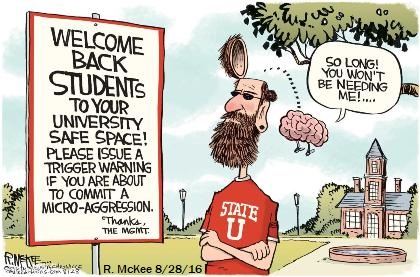 I expressed in that letter's concluding sentence that "things were nice [with CSI and Skeptical Inquirer] while they lasted." And
I can think of a few other little things from the age of the dinosaurs (like me) that were also nice while they lasted.
For instance, can today's college generation even
conceive of a time when freedom of speech on campus was championed? When exposing students to disparate viewpoints was embraced as an
indispensable means of expanding minds, rather than anathematized for fear of exploding heads? When "conservative professor" had not yet
become an offensive oxymoron? And achieving "diversity" referred to something other than a student body of myriad colors, genders and
sexual orientations indoctrinated in a singular, "progressive," philosophy?
I expressed in that letter's concluding sentence that "things were nice [with CSI and Skeptical Inquirer] while they lasted." And
I can think of a few other little things from the age of the dinosaurs (like me) that were also nice while they lasted.
For instance, can today's college generation even
conceive of a time when freedom of speech on campus was championed? When exposing students to disparate viewpoints was embraced as an
indispensable means of expanding minds, rather than anathematized for fear of exploding heads? When "conservative professor" had not yet
become an offensive oxymoron? And achieving "diversity" referred to something other than a student body of myriad colors, genders and
sexual orientations indoctrinated in a singular, "progressive," philosophy?
But that was all before the extinction events that "canceled" us dinosaurs and heralded a particularly pernicious strain of progressivism, a "virus of the mind" that has spread pandemically throughout academia, the news and social media, and almost every other facet of our society. The year 1984 may have come and gone with nary a whiff of Orwell's fictional thought police, but 30-something years later, John Ellis' The Breakdown of Higher Education and Heather Mac Donald's The Diversity Delusion read far more frighteningly.
My medical diagnosis is that this intolerance-inducing virus has infected my own skeptical community, particularly with regard to
climate-change alarmism and the compulsion to maliciously stigmatize "skeptics" as loathsome "deniers." My prescription is simply
a return to a climate of open-minded discourse, but I fear it may be a generation or more before the prevailing "cancellation" aberration is
properly repudiated for its mandated group-think and ends-justify-the-means propensity for brutishness. To turn a phrase or two on
Michael Mann, who has everything to lose were his "hockey stick" ever to reveal crippling cracks, "Climate-change alarmists are basically
asking skeptics to abandon critical thinking in favor of consensus-building. Only it's the entire population, not a single human being,
whose intellectual freedom is at dire risk."